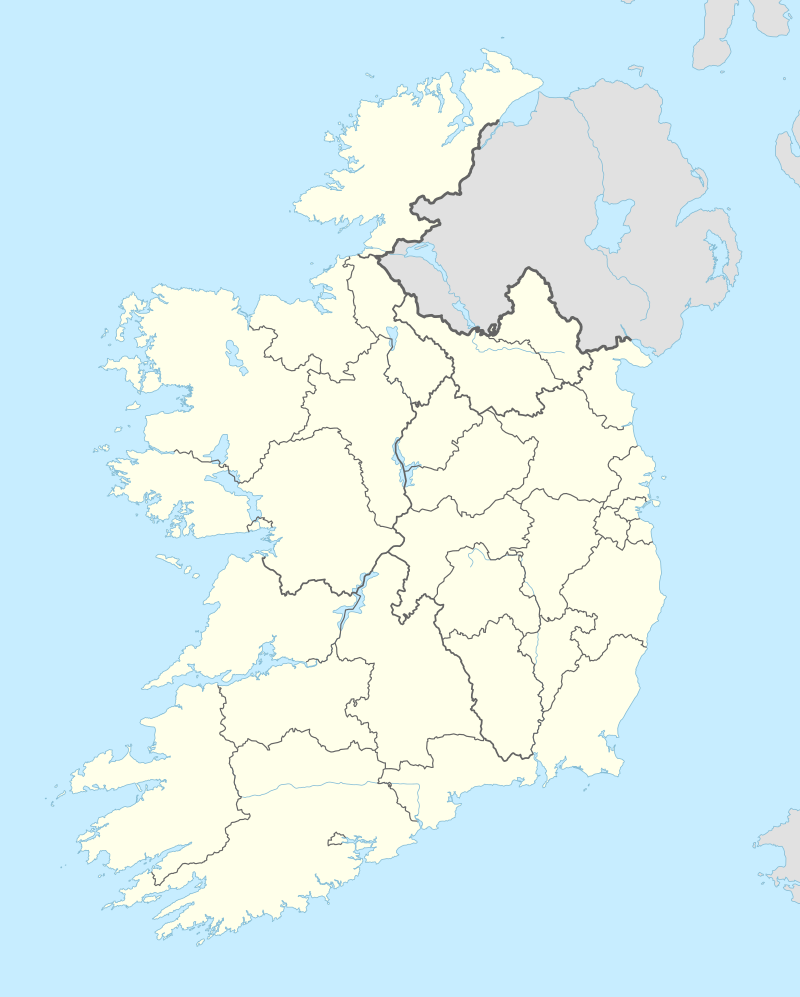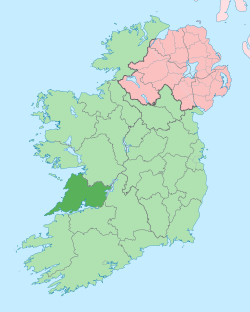Bodyke
Bodyke (/ˈboʊdaɪk/; Irish: Lúbán Díge) is a village and Catholic parish in County Clare, Ireland. It is located in eastern Clare. In the 1880s the Bodyke evictions were widely publicised.
Bodyke Lúbán Díge | |
|---|---|
Catholic parish | |
 Bodyke | |
| Coordinates: 52°53′02″N 8°35′59″W | |
| Country | Ireland |
| Province | Munster |
| County | County Clare |
| Time zone | UTC+0 (WET) |
| • Summer (DST) | UTC-1 (IST (WEST)) |
Village
The village of Bodyke lies in the foothills of the Slieve Aughty mountains. Its name may come from "Both-Teig" (Teig's hut).[1]
Parish
The Roman Catholic parish of Bodyke is part of the Roman Catholic Diocese of Killaloe.[2] The modern parish incorporates the medieval parish of Kilnoe and the southern part of the medieval parish of Tuamgraney, which may have been combined early in the 18th century.[1] Bodyke is noted for its local church, the Church of Our Lady of the Assumption, which was originally built in 1844.[1] The church of St Joseph's serves Tuamgraney.[3]
Schools are Bodyke National School, Scariff Community School and Tuamgraney National School.[4] The Raheen Community Hospital in Tuamgraney is a public nursing home and day center.[5]
Bodyke evictions
In the 1880s Colonel O'Callaghan, the principal landowner at Bodyke, had refused to lower the rents he charged his tenants. They were in distress.[6] In June 1887 O'Callaghan called for police assistance in evicting the tenants, who resisted by force, witnessed by large crowds.[7] Thirty-five of his tenants returned to their homes after being evicted.[8] Twenty six people, all but four of them women, were charged with assaulting and obstructing the forces of the law, with sentences ranging from acquittal to three months hard labor.[7] The prolonged affair was widely reported and caused angry debates in Parliament. As one member said, "The name of Bodyke stank in the nostrils of the Government..."[8] The evictions continued into the 1890s, with goods and livestock seized in lieu of rent. Often the livestock died of poisoning soon after.[9]
.jpg) The O'Halloran girls, c. 1888-90
The O'Halloran girls, c. 1888-90.jpg) Suppressed meeting, Bodyke, c. 1888-90
Suppressed meeting, Bodyke, c. 1888-90.jpg) Widow Macnamara in her fortress, c. 1888-90
Widow Macnamara in her fortress, c. 1888-90
Notable people
The novelist Edna O'Brien and family historian Edward MacLysaght came from the parish of Bodyke.[1]
References
- Bodyke (Lúbán Díge).
- Bodyke (Kilnoe and Tuamgraney), Profile.
- Bodyke (Kilnoe and Tuamgraney), Churches.
- Bodyke (Kilnoe and Tuamgraney), Schools.
- Raheen Community Nursing Unit.
- Home Affairs: A National Party, p. 150.
- The Evictions, Clare County Library.
- Parliament 1888, p. 1334.
- Disturbances and Distress.
Sources
- "Bodyke (Lúbán Díge)". County Clare Library. Retrieved 11 September 2013.
- "Bodyke (Kilnoe and Tuamgraney), Churches". Diocese of Killaloe. Archived from the original on 4 March 2016. Retrieved 13 April 2014.
- "Bodyke (Kilnoe and Tuamgraney), Profile". Diocese of Killaloe. Retrieved 30 March 2014.
- "Bodyke (Kilnoe and Tuamgraney), Schools". Diocese of Killaloe. Archived from the original on 4 March 2016. Retrieved 13 April 2014.
- "Disturbances and Distress". Clare County Library. Retrieved 13 April 2014.
- "Home Affairs: A National Party". The Fortnightly Review. Chapman and Hall. 1887. Retrieved 13 April 2014.
- Parliament, Great Britain (1888). Hansard's Parliamentary Debates. Hansard. Retrieved 13 April 2014.CS1 maint: ref=harv (link)
- "Raheen Community Nursing Unit". My Home from Home. Retrieved 13 April 2014.
- "The Evictions". Clare County Library. Retrieved 13 April 2014.
